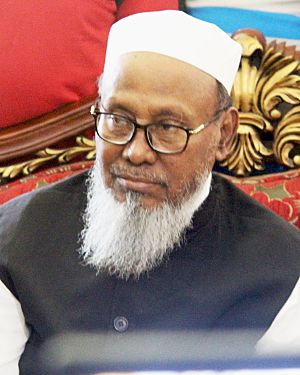A. B. M. Mohiuddin Chowdhury facts for kids
Quick facts for kids
A. B. M. Mohiuddin Chowdhury
|
|
|---|---|
|
এ বি এম মহিউদ্দিন চৌধুরী
|
|

Chowdhury in 2017
|
|
| 3rd Mayor of Chittagong | |
| In office 11 March 1994 – 1 February 2010 |
|
| Preceded by | Mir Mohammed Nasiruddin |
| Succeeded by | Mohammad Manjur Alam |
| Personal details | |
| Born | 1 December 1944 Gohira, Raozan Upazila, Chittagong, Bengal Presidency, British India, (now Bangladesh) |
| Died | 15 December 2017 (aged 73) Chittagong , Bangladesh |
| Spouse | Hasina Mohiuddin |
| Children |
|
| Relatives | The Chowdhury family of Chittagong |
| Alma mater |
|
A. B. M. Mohiuddin Chowdhury (born 1 December 1944 – died 15 December 2017) was an important politician from the Bangladesh Awami League party. He was the mayor of Chittagong, which is the second-largest city in Bangladesh. He served as mayor for three terms in a row.
Contents
Early Life and Education
A. B. M. Mohiuddin Chowdhury was born on 1 December 1944. His birthplace was Gohira village in the Raozan area of Chittagong District, in what was then British Raj. His father, Hosen Ahmed Chowdhury, worked for the railway. His mother was Bedowra Begum.
He finished his school studies and joined Chittagong City College in 1962. Later that year, he moved to Chittagong Polytechnic Institute. He was asked to leave the institute because he was very active in student politics.
In 1965, he went back to Chittagong City College and graduated in 1967. He then started studying for a higher degree at the University of Chittagong. He focused on Islamic History and Culture but left before finishing his master's degree.
Political Journey
Chowdhury was a key student leader in Chittagong. He was the general secretary of the Chittagong city branch of the Bangladesh Chhatra League, a student political group. He also led a student movement called Sorbodolio Chhatra Sangram Parishad. This group organized a big protest in Chittagong on 1 March 1971.
After a famous speech by Sheikh Mujibur Rahman on 7 March 1971, Chowdhury and other students took firearms from a club and an arms depot. He was arrested by the Pakistan Army but was later released. He then went to India to train with the Mukti Bahini, a freedom fighter group. After his training, he became a commander.
After the death of Sheikh Mujibur Rahman, Chowdhury formed a special group called Mujib Bahini. This group aimed to resist the new government. He was arrested again but managed to escape to India.
Becoming Mayor of Chittagong
In 1994, Chowdhury was elected as the Mayor of Chittagong. He was the first person to be elected to this position. He won against Mir Mohammed Nasiruddin, who was the previous mayor. Chowdhury won by 16,000 votes.
He won his second election easily in 2000. The opposing party, Bangladesh Nationalist Party, did not take part in that election. In 2005, he faced a strong challenge. The government at the time fully supported his opponent, Mir Mohammed Nasiruddin. Even the Prime Minister campaigned for Nasiruddin. Despite this, Chowdhury won the election again.
In 2006, he became the President of the Chittagong city Awami League. He served as mayor for 17 years, winning three times. His time as mayor ended in 2010 when he lost the election to Bangladesh Nationalist Party candidate M Manjurul Alam.
City Development Work
During his time as mayor, Chowdhury focused on improving Chittagong. He set up five maternity clinics for mothers and babies. These clinics offered special care for newborns and advanced surgeries for women. They were run by expert doctors.
Chowdhury was also the first mayor in Bangladesh to start a private university. This was Premier University, Chittagong, which was first located at the Chittagong City Corporation building. Under his leadership, the city corporation also opened nine colleges for higher education.
They also started computer training centers and a midwife training center. A healthcare technology training center was also established. This was the first in Bangladesh to teach people how to use medical technology like radiology. To help adults learn, eight night colleges were opened. The city authority also managed eight Hindu religious education centers. These centers taught Sanskrit to minority students.
Time in Detention
In January 2007, a new government came to power in Bangladesh. On 7 March, Mohiuddin Chowdhury and other politicians were arrested. He was held in different prisons, often without being able to communicate with anyone. He was first taken to a distant jail in Bandarban District.
While he was in prison, his daughter became very ill with blood cancer in Thailand. He was held for 21 months without a trial. The government did not let him leave prison to see his daughter. He was finally released on 8 October 2008, after a court order.
Even after his release, the government kept his passport. They did not allow him to fly to Thailand immediately. On 17 October, just minutes before he was allowed to board a plane to Bangkok, his daughter passed away.
Passing Away
A. B. M. Mohiuddin Chowdhury passed away at 3:00 am on 15 December 2017. He was buried in his family graveyard at Chashma Hill. The Bangladesh Police performed an honor guard at his burial.
 | Calvin Brent |
 | Walter T. Bailey |
 | Martha Cassell Thompson |
 | Alberta Jeannette Cassell |

